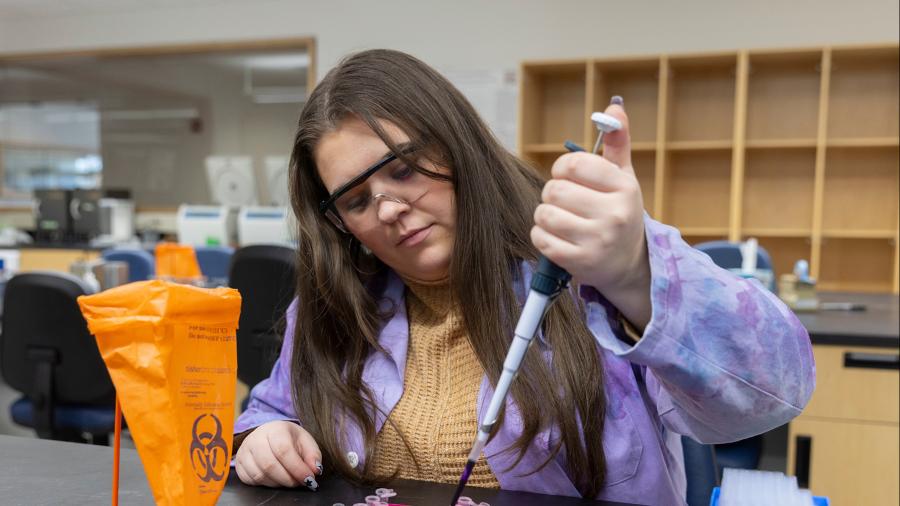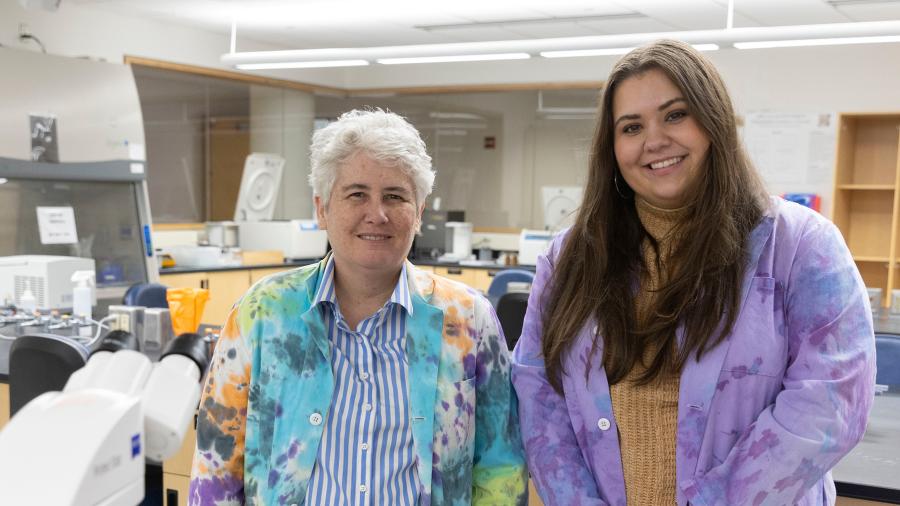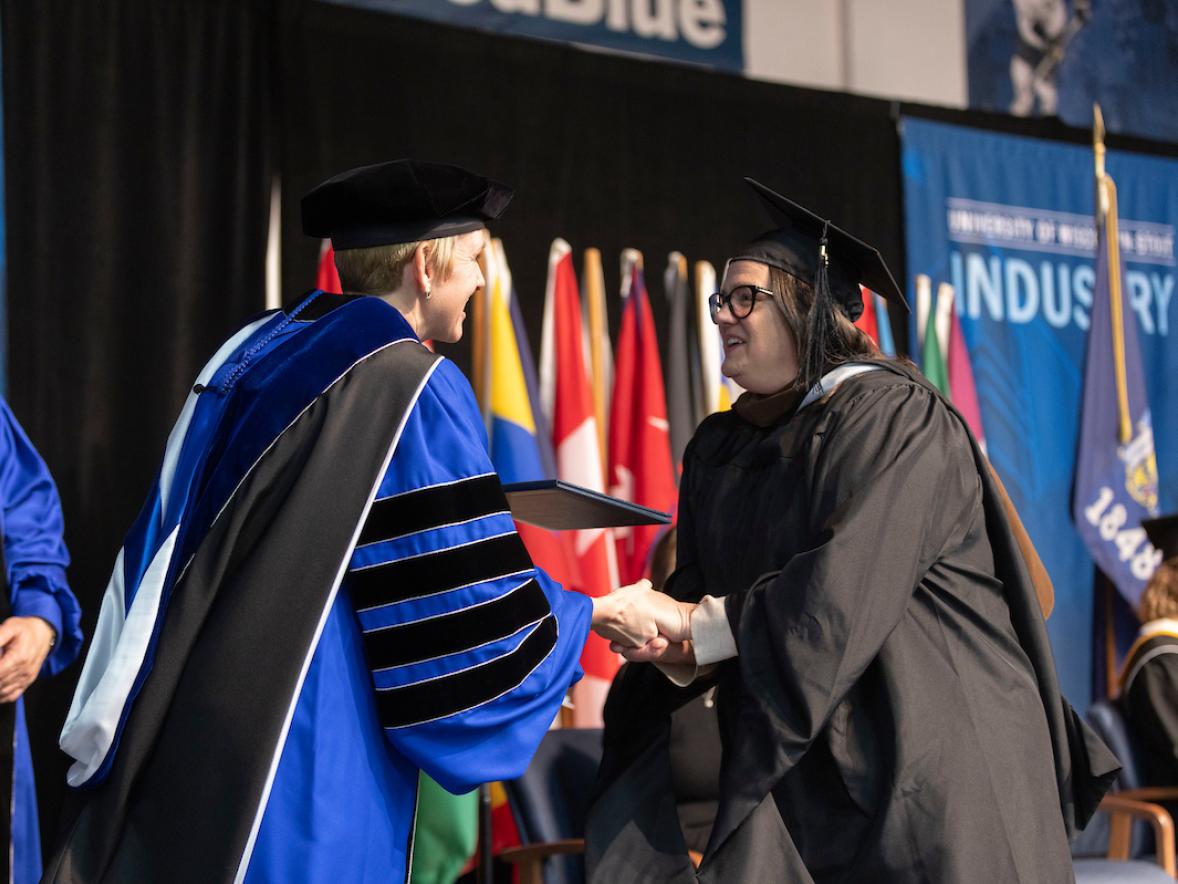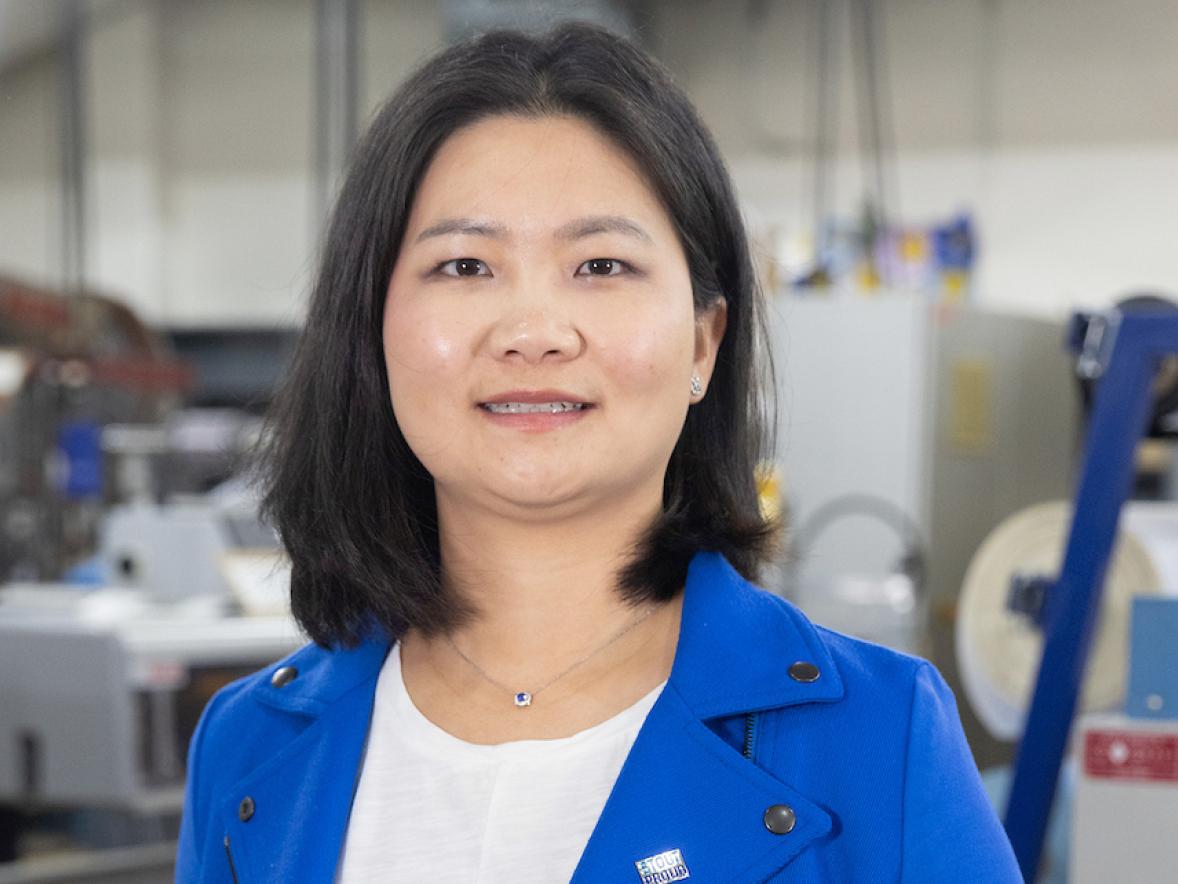Ava Cinealis was interested in science when she graduated from Sheboygan North High School, but she wanted to do more in college than learn it from a book: She wanted to apply her knowledge — get into labs, use instruments, do research.
It’s why she traveled across the state to major in applied biochemistry and molecular biology at University of Wisconsin-Stout, where applied learning is part of the academic DNA.
On Wednesday, March 6, she will travel to another part of the state, Madison, with nine other UW-Stout students to showcase their undergraduate experience in a Universities of Wisconsin marquee event, Research in the Rotunda, at the Capitol. Select students from all UW campuses will be presenting research posters to legislators, state officials and others.

Cinealis’ project, “Protein Structures of Prion Disease,” that uses generative AI in a search for a cure to deadly diseases, is exactly the kind of high-level research she hoped to do as a college student. Her frequent opportunities to work in labs, work closely on research with professors with small class sizes and make industry connections for internships have all supported her decision.
“I love that there are professors who want us to call them by their first name. We are able to do our own experiments and learn an instrument or method. It’s really personalized,” said Cinealis, a senior who will graduate in May.
Her research bears that out. She has been a teaching and research assistant for Professor Jen Grant, the adviser on her project. She also is working with Grant on another prior research project that they, along with a second student, hope to have published.
Prion diseases are caused by proteins that develop plaque and misfold, causing a chain reaction and cell death. The diseases include Creutzfeldt-Jacob and mad cow disease, which is transmissible to humans through infected beef, and chronic wasting disease in deer and other animals. There is no known cure for prion diseases, which typically cause death.

“It’s underresearched. There’s still so much to know, but I felt like I was doing valuable work,” Cinealis said. “I went into research because of where it took me. You don’t know what you’ll find.”
Part of Cinealis’ research was conducted using AI software called AlphaFold. Two of Grant’s classes also are using it for research on protein biochemistry.
“Up until the past few years, protein chemists have been limited to using molecular dynamics simulations to generate predicted structures and predicted interactions. AlphaFold uses a different approach, of course, using the evidence of the library of past structures to formulate predictions,” Grant said.
AlphaFold can differentiate human prions from those in deer that cause chronic wasting disease. “We’re looking into ways to predict how likely a prion would be to misfold,” Cinealis said.
“Ava has proven a quick study in this area, where she leads in developing and testing her ideas,” Grant said. “Her efforts and data revealed correlations and trends where a strain develops first. We hope that understanding these correlations can help us understand why prions, and other amyloid proteins, form plaques in the first place,” Grant said.
Along with her skills as a researcher, Cinealis excels at communicating about research, Grant said. She coordinated a video explaining the project. Three other Research in the Rotunda students also created videos — see links below — that were produced by UW-Stout video production majors.
“Ava asks exceptional questions; she understands the projects she has worked on at the molecular level and makes critical connections. She has translated these critical connections into real wins for my research laboratory,” Grant said.
Cinealis landed a competitive, summerlong internship in 2023 at Thermo Fisher Scientific in Middleton. The work involved chemical characterization and testing on pharmaceutical products.
An Honors College student at UW-Stout, she also has enjoyed getting involved in University Recreation programs and is vice president of the Delta Zeta sorority. She has a twin sister, Emma, who is majoring in fashion and retail and also will be graduating this spring.
Other UW-Stout presenters at Research in the Rotunda
Other students presenting and their faculty mentors are:
- Kal Breeden, of Lakeville, Minn., a senior majoring in environmental science, “Urban Stream Corridor Restoration Effects on Sediment Loading”; Keith Gilland, associate professor, Nicole Hayes, assistant professor, and Julia Chapman, lecturer, biology
- Jack Brown, of Spring Valley, a junior majoring in applied social science, ”Will College Students Agree with Political Opinions Along Party Lines?”; Courtney Juelich, assistant professor, and Tina Lee, professor, social science
- Genevieve Czaplewski, of Grand Island, Neb., a senior majoring in applied social science, “The Influence of Trust in Science and Political Leaning on Perceptions of Drinking Water Quality”; Kim Zagorski, professor, social science. Watch the video
- Aidan Drew, of Lake Mills, a junior majoring in applied mathematics and computer science, “Smart Farming and Precision Agriculture”; Ahmed El-Magrous, assistant professor, Saleh Alnaeli, assistant professor, and Keith Wojciechowski, professor, all mathematics, statistics and computer science
- Ethan Kalin, of St. Paul, a senior majoring in applied science, “Temporal Analysis of Toxin-producing Cyanobacteria”; Hayes
- Casie Kopischke, of St. Paul, a junior majoring in environmental science, “Comparing the Effects of Restoration Age on Stream Ecosystem and Community Dynamics”; Hayes, Gilland, Chapman
- Emma Nuechterlein, of Kewaunee, a senior majoring in applied social science, “What Do Americans Know? A Study of the Relationship Between Students U.S. Civic Knowledge and Their Demographics”; Juelich, Lee
- Josh Pederson, of Oronoco, Minn., a senior majoring in computer science, “Smart Farming and Precision Agriculture”; El-Magrous, Alnaeli, Wojciechowski. Watch the video
- Isabel Smith, of Greendale, a senior majoring in game design and development-art, “Kintsugi 3D Viewer: User-Centric Design for Cultural Heritage Accessibility”; Michael Tetzlaff, assistant professor, mathematics, statistics and computer science. Watch the video
Each UW university is allowed six student presenters, but UW-Stout has four additional students because their research is through the Freshwater Collaborative of Wisconsin.
Students were nominated for the event by faculty and staff. Nominations, including a research abstract, were scored by a student research committee.
Faculty-led research is one aspect of the experiential learning required in all UW-Stout undergraduate and graduate programs and part of the university’s polytechnic advantage.
Faculty, staff also attending
Attending the event with the students will be UW-Stout Chancellor Katherine Frank, Provost Glendalí Rodríguez, several staff and many of the faculty advisers.
“Research in the Rotunda is such an important yearly event, as it gives our UW-Stout students a high-profile platform to convey their research with ideas that could ultimately benefit both the people of Wisconsin and the world,” said Anne Hoeltke, director of UW-Stout’s Office of Research and Sponsored Programs, who will be attending.
“The ability to share research with legislators provides an opportunity to highlight the importance of research and the economic impact on the state,” she said.
Research at UW-Stout by students, faculty and staff is coordinated through ORSP, which provides grants funded by Stout University Foundation.
ORSP also organizes UW-Stout’s annual Research Day, on Monday, April 29, where more than 100 student projects will be presented. Additional work by School of Art and Design students will be presented at the Senior Show from 6 to 9 p.m. Friday, May 3.
UW-Stout also will have 14 students presenting at the National Conference on Undergraduate Research April 8-10 in Long Beach, Calif. Cinealis presented at NCUR in 2023 when it was held at UW-Eau Claire.
###






